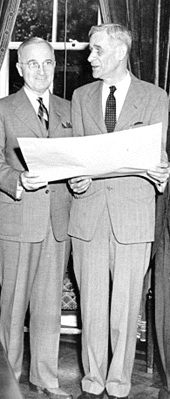Charlie Ross (journalist): Difference between revisions
No edit summary |
No edit summary |
||
| Line 2: | Line 2: | ||
'''Charles Griffith Ross''' ([[1885]] - [[1950]]) was a [[White House Press Secretary]] between [[1945]] and [[1950]] for [[Harry S. Truman]]. |
'''Charles Griffith Ross''' ([[1885]] - [[1950]]) was a [[White House Press Secretary]] between [[1945]] and [[1950]] for [[Harry S. Truman]]. |
||
Ross graduated with Truman and Truman's eventual wife [[Bess Truman]] in the [[Independence, Missouri]] High School Class of 1901. In 1905 he graduated from the [[University of Missouri–Columbia]]. In 1908 he became the first professor of the newly formed [[Missouri School of Journalism]]. |
Ross graduated with Truman and Truman's eventual wife [[Bess Truman]] in the [[Independence, Missouri]] from Independence High School (now known as [[William Chrisman High School)]] Class of 1901. In 1905 he graduated from the [[University of Missouri–Columbia]]. In 1908 he became the first professor of the newly formed [[Missouri School of Journalism]]. |
||
In 1918 he came the Chief Washington correspondent for the [[St. Louis Post-Dispatch]]. He won the the [[1932 Pulitzer Prize]] for his article entitled, "The Country's Plight, What Can Be Done About It?", a discussion of the economic situation of the [[United States]]. |
In 1918 he came the Chief Washington correspondent for the [[St. Louis Post-Dispatch]]. He won the the [[1932 Pulitzer Prize]] for his article entitled, "The Country's Plight, What Can Be Done About It?", a discussion of the economic situation of the [[United States]]. |
||
Revision as of 20:51, 29 November 2006

Charles Griffith Ross (1885 - 1950) was a White House Press Secretary between 1945 and 1950 for Harry S. Truman.
Ross graduated with Truman and Truman's eventual wife Bess Truman in the Independence, Missouri from Independence High School (now known as William Chrisman High School) Class of 1901. In 1905 he graduated from the University of Missouri–Columbia. In 1908 he became the first professor of the newly formed Missouri School of Journalism.
In 1918 he came the Chief Washington correspondent for the St. Louis Post-Dispatch. He won the the 1932 Pulitzer Prize for his article entitled, "The Country's Plight, What Can Be Done About It?", a discussion of the economic situation of the United States.
In 1934 he became the editor page editor for the Post-Disptach and then in 1939 became a contributing editor for the paper until Truman asked him to become his Press Secretary in 1945.
Despite Ross's personal relationship with Truman, he was to be accused by reporters of not running a tight ship in coordinating press releases, not being aware of everything going on in the Presidency, not burnishing the President's image, not being aware of the needs for spot news, and being hard of hearing.
Ross died at his desk in the White House in December 1950 after giving a press conference and as he was preparing to make some comments to the television news.
His widow Florence Griffin (who he married in 1918) married Kansas City Star editor Roy A. Roberts in 1953.
His grandson, John Ross is the author of the novel Unintended Consequences.

